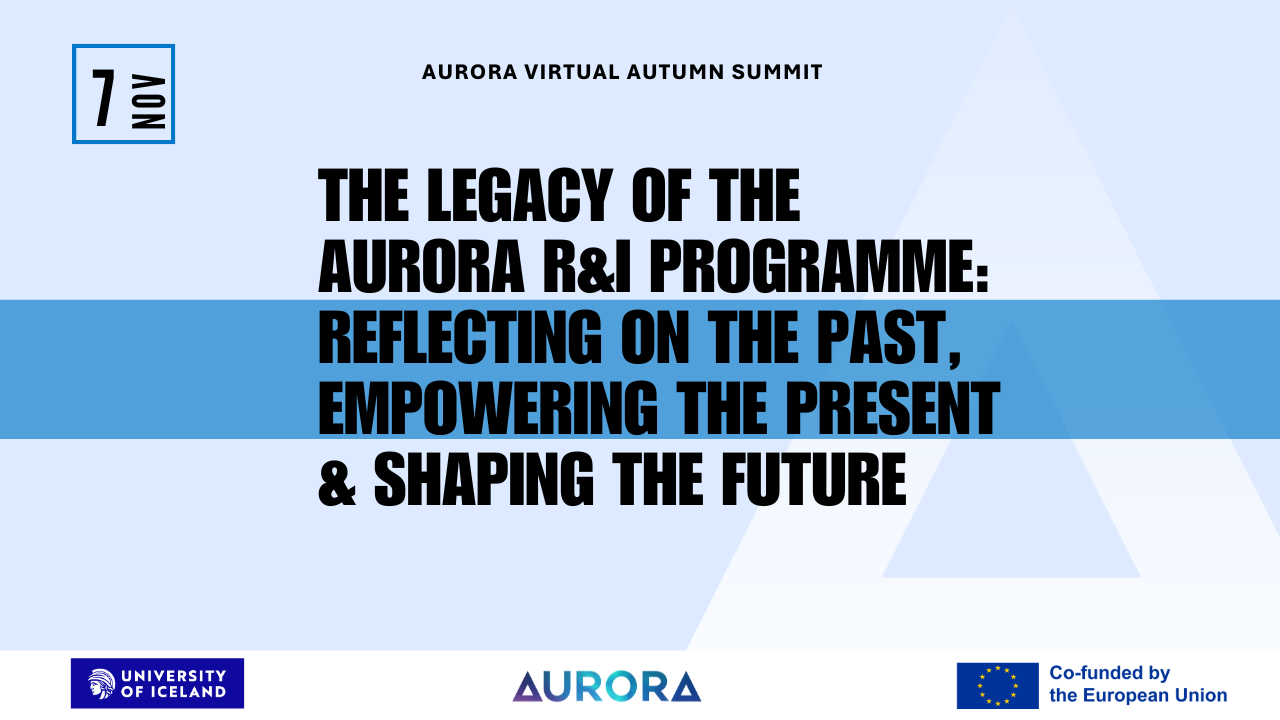Aurora Virtual Autumn Summit: Reflecting on the Legacy and Vision for the Future

The Aurora Virtual Autumn Summit brought together academic minds to reflect on the achievements of the Aurora Research and Innovation (R&I) Programme and to chart its course toward the future. The plenary session, “The Legacy of Aurora R&I Programme: Reflecting on the Past, Empowering the Present, Shaping the Future,” offered an insightful exploration of collaborative research efforts within Aurora universities. This inspiring event highlighted critical themes like open science, shared resources, and strategies for fostering future research collaborations.
A Roadmap for Innovation
Svandís Halldórsdóttir, Head of the Grants Office at the University of Iceland, emphasized the Aurora R&I roadmap’s cornerstone achievements. “This roadmap is built on six core building blocks,” Halldórsdóttir shared, detailing components such as joint online platforms, capacity-building plans, and the creation of open science training modules. She stressed the importance of institutional trust and collaboration, underscoring that Aurora universities have the collective will to innovate together even without substantial funding.
Svandís Halldórsdóttir acknowledged the challenges faced, such as navigating local legislation and addressing structural differences among universities. The feasibility study conducted during the project identified actionable strategies to enhance collaboration. She stated, “The main conclusion was to focus on uniting researchers around funding opportunities and encouraging research support staff to exchange best practices.”
Open Science and the Future
Sander Bosch, Chief Open Science Officer at VU Amsterdam, provided a compelling overview of the progress in open science practices under the Aurora R&I Programme. Bosch cited the UNESCO Open Science framework as foundational, broadening the scope of open science to include not only open access to knowledge but also increased collaboration and inclusivity. “Open science is a value-driven framework that aligns perfectly with Aurora’s mission,” he remarked.
Bosch showcased innovations like the Aurora Open Science Monitor and training programs that aim to make open science practices accessible for early-career researchers. He highlighted the importance of sustainable tools and increased community involvement in firmly establishing these practices within Aurora’s institutions.
Building Research Communities
Professor Guðmundur Hálfdánarson of the University of Iceland emphasized the critical role of fostering academic collaboration. Reflecting on Aurora’s journey, he highlighted the need to move beyond administrative coordination to actively engaging academics in shared research endeavors. “We must involve the academic community and make Aurora a part of their daily lives,” Hálfdánarson asserted, pointing to new initiatives like summer schools and collaborative research projects as steps in the right direction.
The roundtable discussions reinforced these sentiments, with participants agreeing that fostering trust and creating real-life opportunities for collaboration are key to building a robust Aurora research community.
A Shared Vision for 2030
The summit closed with a look toward Aurora 2030, the ambitious next phase. A focus on sustaining and expanding the tools, networks, and practices established under the R&I Programme was at the forefront. As one participant aptly summarized, “The most important outcome of this project is the trust we’ve built. That trust is the leverage we need to share more than strengths—it’s the foundation for shared resources and a unified vision.”
The Aurora Virtual Autumn Summit demonstrated that Aurora is more than a collaboration; it is a community united by a shared commitment to advancing research and education for societal benefit. Watch a recap of the summit on YouTube.